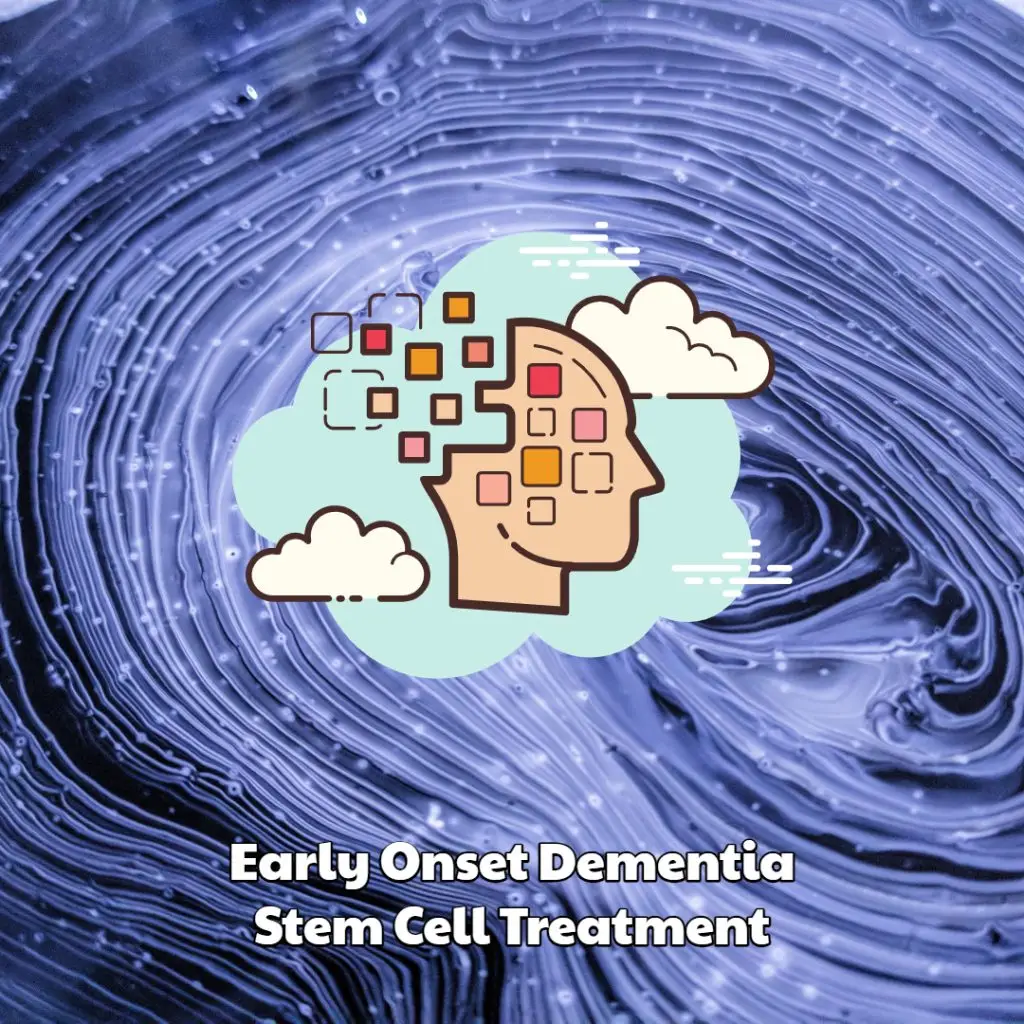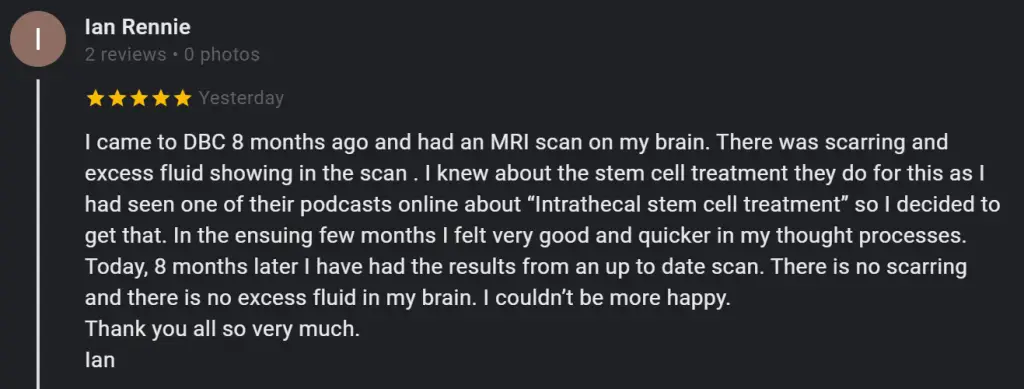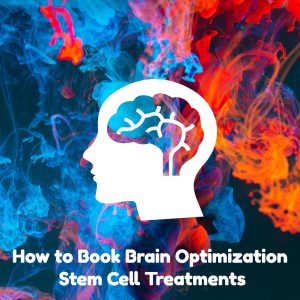
The Early Onset Dementia Stem Cell Treatment Consists of the Following:
50 Million Stem Cells via Intrathecal Injection
PRICE: $3,300 USD
- Day 1: Arrive and Rest
- Day 2: Bloodwork, Payment and take MSCs out of cultivation
- Day 3: Intrathecal Treatment
- Day 4: Rest
- Day 5: Fly Home
- If you are in town for more than 5 days then the itinerary may not be all consecutive days
This treatment cannot be done if the patient is on blood thinners. Call for guidance if the patient is taking a blood thinner for alternative recommendations.
The Early Onset Dementia Stem Cell Treatment at Dream Body Clinic
As we age, our cognitive abilities may begin to decline. However, some individuals may experience early onset dementia, a condition that affects memory, thinking, and daily activities well before the age of 65. Dream Body Clinic understands that this can be a distressing and challenging situation, and that is why we have developed an innovative stem cell treatment to help manage early onset dementia.
Our stem cell therapy for early onset dementia involves using mesenchymal stem cells derived from umbilical cord tissue and placenta that is then cultivated to the 3rd round. These stem cells are a powerful tool for regenerative medicine because they have the ability to develop and regenerate healthy cells, tissues, and organs in the body.
The treatment itself is minimally invasive, with the cells being delivered via intrathecal injection. Once they are introduced into the spinal fluid, they travel to the brain and promote neuroregeneration, which means that they help repair damaged nerve cells or produce new ones, to improve cognitive function.
At Dream Body Clinic, we understand that early onset dementia can take a toll on not only the individual but also the family and loved ones. Our team of experts is committed to providing comprehensive care by developing a tailored treatment plan that fits your unique needs.
Our stem cell therapy for early onset dementia has shown promising results, including:
- Improved memory and learning ability
- Enhanced attention span and focus
- Reduced inflammation in the brain
- Increased blood flow to the brain
We are committed to helping you or your loved one live a fulfilling life, and that starts with managing early onset dementia. Our stem cell therapy is a non-invasive, safe, and effective way to promote neuroregeneration and potentially improve cognitive function.
Don’t let early onset dementia control your life. Contact us today to learn more about our innovative stem cell therapy and how it can benefit you or your loved one.
Call (888) 704-3977 For a Free Consultation
or email us at info@dreambodyclinic.net
How do Mesenchymal Stem Cells Treat Early Onset Dementia Recovery?
Mesenchymal stem cells (MSCs) have been shown to have a neuroprotective and regenerative effect in early onset dementia recovery. The mechanisms by which MSCs exert their therapeutic effects include:
Anti-inflammatory actions: Following early onset dementia, inflammation plays a significant role in exacerbating the disease and causing secondary damage. MSCs have been shown to suppress inflammation, thereby reducing the release of inflammatory cytokines and promoting tissue repair.
Neurotrophic effects: MSCs secrete various growth factors, such as brain-derived neurotrophic factor (BDNF), that promote the survival and regeneration of neurons damaged by early onset dementia.
Migration and homing: MSCs can migrate to the site of injury and guide differentiation and regeneration of various cell types that form the structural and functional components of the brain, including neurons, astrocytes, and oligodendrocytes.
Angiogenesis: MSCs promote the formation of new blood vessels, leading to improved blood flow and oxygen delivery to the injured area.
Overall, the use of MSCs in early onset dementia recovery is a highly effective approach for restoring neurological function and improving quality of life in people with early onset dementia.
Intrathecal Injection of Mesenchymal Stem Cells for Early Onset Dementia Recovery
Intrathecal injection of mesenchymal stem cells (MSCs) has emerged as a miraculous therapy for early onset dementia recovery. This method involves the injection of MSCs into the cerebrospinal fluid surrounding the spinal cord. This sounds like a very painful place to be injected, but the injection itself does not hurt much. This is because our trained anesthesiologists that apply the injection use a 30 gauge syringe. This syringe is as small in diameter as an insulin syringe. This small size allows it to get into the spinal cord area without risking damage to the spinal cord.
The intrathecal injection of MSCs for early onset dementia is based on the idea that the cells can migrate to the site of damage in the brain and promote tissue repair and regeneration. Once injected, MSCs don’t have to cross the blood-brain barrier and travel through the cerebral spinal fluid directly to the brain, where they can exert their therapeutic effects.
The mechanisms of action of intrathecal MSCs injection for early onset dementia include:
Promoting neurogenesis: Studies indicate that MSCs have the ability to guide differentiation and regeneration of neurons. They promote neurogenesis, helping to restore damaged neural networks.
Modulating inflammation: MSCs release anti-inflammatory cytokines which attenuate inflammation in the brain and help to prevent additional neuronal damage.
Stimulating Angiogenesis: MSCs promote the growth of new blood vessels in the brain, which helps improve cerebral perfusion and oxygen supply.
Secreting trophic factors: Injection of MSCs promotes the secretion of various trophic factors, such as brain-derived neurotrophic factor (BDNF), vascular endothelial growth factor (VEGF), and insulin-like growth factor 1 (IGF-1), which exert protective and regenerative effects on neurons damaged by early onset dementia.
Overall, intrathecal injection of MSCs for early onset dementia recovery is designed to improve functional outcomes in people with early onset dementia.
How MSCs Help The Specialized Immune System of the Brain
Mesenchymal Stem Cells (MSCs). Once the MSCs get to the brain they get to work targeting inflammation. The neuropathological hallmarks of early onset dementia are often accompanied by neuroinflammation, which is intended to protect the body, but also can contribute to aggravation of damage when it becomes excessive. This is why the ability of MSCs to reduce the brain inflammation is so important.
Mesenchymal Stem Cells have a profound effect on macrophages and in the brain these are microglia. The microglia account for 10% to 15% of the cells in the brain. They are very important, so if they are not working properly then brain health will be off balance. Mesenchymal stem cells do a great job of helping the microglia function properly and proliferate. The microglia are resident macrophage cells, they act as the first and main form of active immune defense in the central nervous system (CNS). In early onset dementia damaged brain cells and blood cells can remain in the area. The microglia are responsible for removing damaged brain cells, dead blood cells, damaged or unnecessary neurons or synapses, and infectious agents. So having plenty of healthy microglia is extremely important to brain health. The MSCs have been shown in multiple studies to increase the number of microglia.
The MSCs also help regulate Astrocytes. Astrocytes perform many functions such as biochemical support of endothelial cells that form the blood–brain barrier, provision of nutrients to the nervous tissue, maintenance of extracellular ion balance and a role in the repair and scarring process of the brain and spinal cord following traumatic injuries. The brain repair role is very important for early onset dementia recovery. Recovering from early onset dementia all relates back to microglia and Astrocyte function, making the early onset dementia stem cell treatment very effective.
MSCs also release neurotrophic factors that guide neural regeneration. Neuronal loss in early onset dementia is partly compensated by MSC transplantation, and this may be one of the mechanisms for MSC therapy in early onset dementia recovery.
How do the induced Tregs from Mesenchymal Stem Cells help Alleviate Early Onset Dementia Symptoms?
Mesenchymal stem cells (MSCs) have the ability to induce the formation of regulatory T cells (Tregs) as a part of their immunomodulatory response to early onset dementia recovery. Tregs are a type of immune cell that plays a crucial role in regulating the immune system and suppressing autoimmune responses in the body. Here are some ways in which Tregs induced by MSCs can help to alleviate early onset dementia symptoms:
Suppressing inflammation: Tregs can suppress inflammation by inhibiting the activity of pro-inflammatory T cells such as T-helper 1 (Th1) and T-helper 17 (Th17) cells, thus helping to reduce inflammation in the nervous system and prevent damage to the myelin sheath.
Regulatory function: Tregs can regulate the immune system and restore self-tolerance by inhibiting the activation of dendritic cells and other immune cells that may initiate or maintain an autoimmune response.
Reducing immune-mediated damage: Tregs can reduce immune-mediated damage to the nervous system by suppressing the activity of T cells that attack myelin and other neural tissues.
Promoting neuroprotection: Tregs can stimulate the production of neuroprotective factors, such as nerve growth factor (NGF) and brain-derived neurotrophic factor (BDNF), which can protect the cells in the nervous system and promote their growth and regeneration.
Inhibiting tissue destruction: Tregs can also inhibit tissue destruction and nerve cell death in MS patients by inhibiting the release of pro-inflammatory cytokines such as interferon-gamma (IFN-γ).
Overall, Tregs induced by MSCs can help to restore immune balance, reduce inflammation, and protect and regenerate the nerves in the nervous system in early onset dementia patients. The ability of MSCs to induce the formation of Tregs is an amazing therapeutic approach for the treatment of early onset dementia Recovery.
Early Onset Dementia Stem Cell Treatment and Chemotaxis
Chemotaxis is the process by which cells are attracted or repelled by specific chemicals in their surrounding environment. The chemicals that act as the attractants or repellents are called chemotactic agents, or chemotaxis. Chemotaxis is an essential process for many biological functions, such as immune responses, wound healing, embryonic development, and bacterial movement.
In the context of regenerative medicine, MSCs are often used to repair or replace damaged tissues. Chemotaxis plays an essential role in the migration of MSCs to the site of tissue damage. When an injury occurs, cells in the damaged tissue release chemotactic agents that attract MSCs to the site of the injury. Once MSCs reach the damaged tissue, they can guide differentiation and regeneration of various cell types to help repair the damaged tissue.
Chemotaxis is regulated by several signaling pathways, including the phosphoinositide 3-kinase (PI3K)/Akt and mitogen-activated protein kinase (MAPK) pathways. These pathways help to regulate the migration and differentiation of MSCs by controlling the expression of various genes and proteins.
Chemotaxis is also an important process in immune responses, as immune cells must be able to migrate to sites of infection or injury to fight off pathogens and repair damaged tissues. In this context, chemotaxis is regulated by various cytokines and chemokines that are produced by the tissue.
Thus, chemotaxis is a fundamental biological process that plays a crucial role in tissue repair, immune responses, and many other physiological processes. This process is crucial for reversing early onset dementia Symptoms.
Early Onset Dementia Stem Cell Treatment Studies
Alzheimer’s Disease Dementia and Stem Cell Therapy – Full Study
Immunomodulatory role of mesenchymal stem cells in Alzheimer’s disease Study – FULL STUDY BELOW
Alzheimer’s Disease Intranasal Mesenchymal Stem Cells Study – FULL STUDY BELOW
Mesenchymal Stem Cells and Neurodegenerative Disease Study – Dreambody Clinic
Anti‑inflammatory effects of bone marrow mesenchymal stem cells on mice with Alzheimer’s disease
Prospects for the application of mesenchymal stem cells in Alzheimer’s disease treatment
Mesenchymal stromal cells for the treatment of Alzheimer’s disease: Strategies and limitations

Side Effects or Risks
The only side effects that have been documented are the following:
- Approximately 1 in 20 patients will experience a slight fever and/or headache for a few hours after treatment or the next day. We have found that 500mg of Tylenol easily resolves this issue.
- Any treatment involving an injection such as an IV runs a risk of infection. We have never had a patient experience an infection due to our sterility protocols,.
- Approximately 1 in about 10 patients will experience some intense lower back pain near the intrathecal injection site that can radiate up and down the spine. It typically lasts a few hours to a few days before fully dissipating. We provide tramacet to all patients as a way to deal with this if it occurs.
- Approximately 1 in about 10 patients will experience a migraine like headache and sometimes nausea with it from the intrathecal treatment. In most cases taking 1 tramacet will relieve these side effects. In some cases the headache can last a few hours to a few days. We provide tramacet to all patients just in case to deal with this.
- A very small percentage of patients for this treatment will be non-responders. As with any medication or treatment there is always a chance of no change. Tylenol does not always fix a headache as an example.
- We do not treat patients that have had cancer within the past 5 years. There is still no conclusive evidence linking stem cells to make cancer worse, but we prefer to stay on the side of safety until more information is available.
Our lab has over 8 years of experience cultivating mesenchymal stem cells with perfect safety and efficacy. See Stem Cell Certification by Clicking Here
How long do the Early Onset Dementia Stem Cell Treatment Results Last?
The results from the the Early Onset Dementia stem cell treatment can last for years or even indefinitely. This is because the stem cells are creating real neurogenesis which means new neurons. They are repairing the brain and that new tissue and neural connections will last. They are also reprogramming your immune system to work the way it was designed to work. Once the immune cells are reprogrammed and any damage is repaired at the spinal cord or brain then things will work the way they should. This will last because it is real regeneration and not just a pill to cover up symptoms.
The mesenchymal stem cells will stay in the system for 8 months to a year. During that time they will interact with immune cells and seek out inflammation where they will guide cellular regeneration. After 8 to 12 months any MSCs that are free bound in your system will differentiate into an osteoblast (bone cell), adipocyte (fat cell) or chondrocyte (cartilage cell). They will then contain the donors HLA markers and your immune system will destroy and remove them. This is an easy process for your immune system and there is no negative reaction in your body from it. Some of the MSCs that were free bound from the IV will find capillaries to call home. They will attach and be considered a pericyte. When they do this they can live in your system indefinitely in a beneficial way to your system.
The Early Onset Dementia Stem Cell Treatment is allowing your body to heal like it did when you were a little kid. There are a lot of other benefits outside of just fixing your brain such as anti-aging. Click Here for An in depth look at how the stem cell IV works for Anti-Aging
How to get the Early Onset Dementia Stem Cell Treatment
In conclusion, the Early Onset Dementia stem cell treatment could be a promising solution for individuals who are facing this condition. The Dream Body Clinic provides personalized treatment plans using stem cells to repair and regenerate damage to the brain and spinal cord which may lead to improved mobility and relief of symptoms. While this treatment is not yet widely available, ongoing research suggests that it is a viable alternative to traditional Early Onset Dementia management methods. If you are interested in learning more about this treatment, we recommend calling us for a free consultation at (888) 704-3977. If you are ready to get the Early Onset Dementia Stem Cell Treatment then click the image below for details on how to book.
How can Cerebrolysin Help in Early Onset Dementia Recovery?
Cerebrolysin is a neuroprotective drug that has been shown to improve outcomes in patients with early onset dementia and Alzheimer’s disease. It is a mixture of peptides and amino acids that are thought to stimulate nerve growth and repair damaged neural tissue.
Studies have shown that cerebrolysin can improve neurologic function, reduce disability, and increase the chances of recovery in patients who have early onset dementia or Alzheimer’s Disease.
Cerebrolysin is believed to work by promoting nerve regeneration and reducing inflammation in the brain. It may also help to increase blood flow to the brain, which is important for the recovery process.
Overall, cerebrolysin has been shown to be a great drug for the treatment of early onset dementia and Alzheimer’s disease and may provide benefits to patients during early onset dementia and Alzheimer’s disease recovery.
